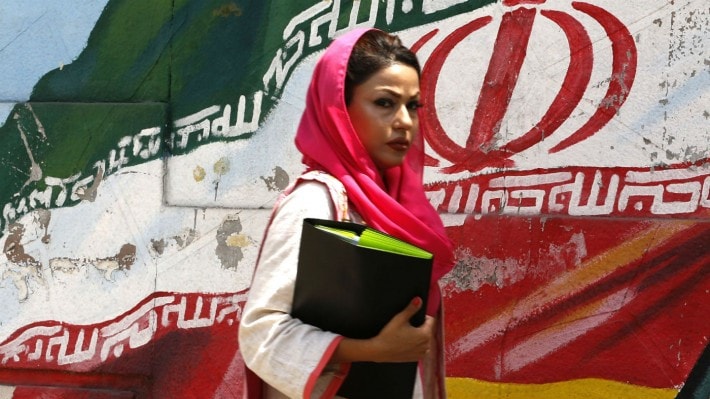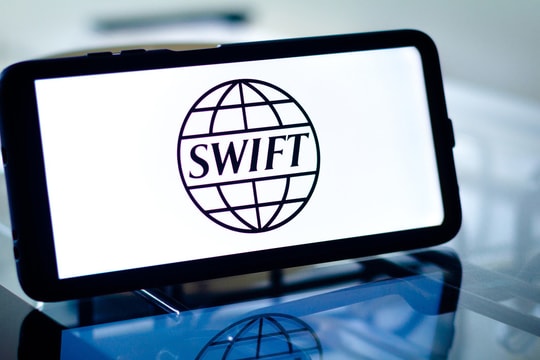US re-imposing sanctions, will Iran suffer?
(Baonghean) - When announcing the US withdrawal from the Iran nuclear deal in May, President Donald Trump also affirmed that Washington would re-impose sanctions on Tehran. From August 7, the financial penalties that former US President Barack Obama lifted on Iran in accordance with the signed agreement officially came back into effect.
What impact will this “first” round of US sanctions have, and who will suffer the most are questions that the public is interested in.
| The US President announced his withdrawal from the Iran nuclear deal in May. Photo: Getty |
America launches economic attack
Since Tuesday, the US has officially re-imposed a series of economic sanctions on Iran. Specifically, according to senior officials in the US administration, this time, the measures that the world's number 1 power will once again target many areas with "full effect", meaning restricting or prohibiting activities such as: the ability of the Iranian government to buy, sell or hold US dollars; buying and selling gold and rare metals; trading or transporting to or from Iran graphite and metals such as aluminum and steel; unspecified transactions related to the Iranian rial.
In addition, the US government also imposed tariffs on Iran's automotive sector, the Islamic Republic could no longer buy US civil aircraft, and the US could no longer import carpets or certain foods from Iran.
The above moves are just the "opening act" for a wave of stronger restrictions planned to take effect in early November, targeting Iran's energy sector and oil exports - the country's key industry.
In addition, financial institutions that cooperate with the Central Bank of Iran, port and shipbuilding companies, insurance and money transfer services, etc. will be at risk of facing sanctions from the US.
According to Vox news site, the purpose of the sanctions, as explained by US officials, is to paralyze the Iranian economy to the point that the local government is forced to stop supporting terrorism and negotiate with the US to end its nuclear program.
However, up to this point, the possibility of things progressing according to Washington's intentions is not high, when recently President Trump's proposal to meet with President Hassan Rouhani "without preconditions" was quickly and bluntly rejected by the Tehran government.
Economic and political impact
As soon as word got out that sanctions were being “renewed”, the Iranian rial plunged against the US dollar, losing more than two-thirds of its value in less than a year, causing inflation and a wave of backlash.
Tehran announced emergency measures on August 5 to prevent the collapse of its currency amid a new wave of protests over worsening living standards, according to The Times. The source said the protests were small “but showed widespread discontent, and the government responded to try to allay fears of an imminent economic collapse.”
Iran's central bank is also said to have implicitly acknowledged the scale of the crisis it is facing, announcing new monetary measures, including lifting currency controls that took effect in the spring in an effort to stem the flow of hard currency out.
The immediate economic impact of the reimposed sanctions could be followed by more far-reaching political consequences.
The nuclear deal opened the door to the West for Iran after years of tension and isolation, but as the Washington Post notes, as that door slowly closes, Iran’s leadership may be returning to the vows of “unyielding resistance” and self-sufficiency that have dominated the country for nearly four decades.
This seems to be true when the public at least realizes that the moderate President of Iran - Hassan Rouhani - who helped sign the nuclear deal and bet his political future on warming relations with the West, has now chosen a much harder-line direction since Trump announced his decision to "turn his back" on the agreement.
After months of escalating rhetoric, last week the Iranian military launched a series of naval exercises in the Strait of Hormuz, backing up threats that if sanctions from the enemy make things difficult for Tehran, they will disrupt shipping on the world's most important oil trade route.
 |
| Iranian people will suffer losses from the US sanctions that have just come back into effect. Photo: AFP |
Who suffers, the government or the people?
According to The Week, US-Iran tensions have been further "inflated" as many in Tehran believe that the Trump administration's ultimate goal is regime change in the Islamic Republic.
US Secretary of State Mike Pompeo seemed to “reinforce” that thinking when speaking to the press during his recent trip to Asia: “We hope we can find a way to make progress, but that will require major changes on the part of the Iranian regime.”
Indeed, the difficulties and obstacles that US sanctions bring to Iran cannot be underestimated. Escalating prices, reduced medicine supply, the opportunity for black market activities to flourish and enrich certain groups of people, etc. are all things that can be easily predicted.
However, analysts still believe that sanctions are not the way to change the thinking of Tehran's leadership, nor do they give those in Washington who support regime change in Iran more reasons to be optimistic. That is what the Washington Post warned, for the simple reason that "Iran's leaders know how to steer and protect power, even in a context of rising public unrest", due to the consequences of US sanctions.
However, it must be admitted that the announcement of the re-imposition of US sanctions comes at a particularly tense time. Hundreds of Iranians have taken to the streets in more than 80 cities to express their opinions on economic issues and the ruling apparatus.
The sanctions are clearly hitting the middle class hard, and many of the sectors targeted by the US, such as the auto sector, will see many people lose their jobs. The resulting drop in incomes will mean Iranians will struggle to afford the basic necessities of life.
Thus, it seems that the Trump administration's stated goal of truly helping the Iranian people by forcing the regime in Tehran to change course has not been as Washington expected.
Now, while Mr. Trump and his team wait to see whether their “move,” that is, huge financial losses, will force Iran to abandon its nuclear ambitions, the burden that arises from this is being borne by the Iranian people themselves.


